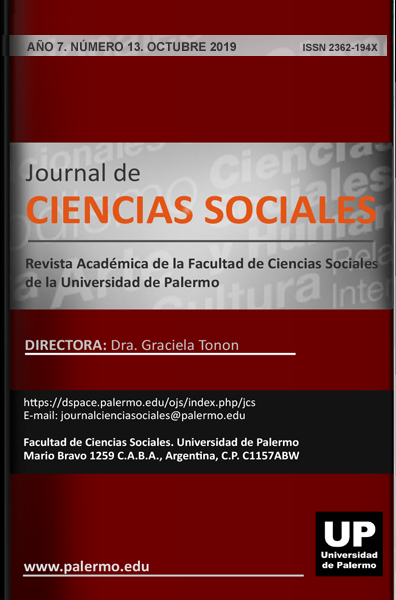Estrategias diplomáticas de los gobiernos de China y Japón hacia América Latina
Resumen
El artículo indaga en las estrategias diplomáticas de los gobiernos de China y Japón hacia América Latina, a partir del estudio de fuentes secundarias y primarias. Por un lado, se aborda la interpretación del condicionamiento histórico que ejerce el modo de inserción de ambos países en el sistema-mundo desde el siglo XIX hasta el siglo XX. En particular, nos enfocamos en los objetivos de la política de relaciones exteriores de China y Japón hacia América Latina, en donde encontramos la motivación económica de obtener recursos naturales. Por otro lado, se ofrece un análisis discursivo centrado en dos alocuciones del Presidente Xi Jinping y el Primer Ministro Shinzo Abe realizadas en Brasil durante el 2014. El corpus de trabajo principal se conforma por esta coincidencia espacio- temporal que nos permite indagar en la situación de discursos en competencia entre ambos gobiernos.
Nuestra argumentación se centra en las estrategias diplomáticas de China y Japón por la interpelación hacia el enunciatario latinoamericano, en condiciones de competencia. Esta se realiza en el campo de la cooperación internacional, organizada por la lógica de la geopolítica del desarrollo, es decir, entre países más o menos desarrollados. A partir de estos condicionamientos, se organiza el discurso diplomático. En el plano retórico, se utilizan recursos como el uso de vocablos y las citas textuales latinoamericanas. En la dimensión temática, se explicitan asuntos comunes como la búsqueda de desarrollo, paz y cooperación. En conjunto, buscan establecer una relación enunciativa de cercanía (“amistad”) como forma de superar las distancias (geográficas y culturales) entre ambas regiones.
Descargas
Citas
Alimonda, H. (2011) (comp.). La colonización de la naturaleza. Buenos Aires: CLACSO.
Cesarin, C. (2007). China y América Latina: auge y caída del Consenso de Beijing y el Consenso de Washington. En A. Girón y E. Correa (coord.), Del Sur hacia el Norte. Economía Política del orden económico internacional emergente (pp. 69-79). Buenos Aires: CLACSO.
Cornejo, R. (2006). “Participación política y democracia de base en China”. En R. Cornejo (comp.), En los intersticios de la democracia y el autoritarismo (pp. 259-331). Buenos Aires: CLACSO.
Escobar, A. (1996) [2007]. La invención del Tercer Mundo, Construcción y deconstrucción del desarrollo. Caracas: El Perro y la Rana.
Gavirati, P (2013), “Ecología Política de la Modernidad – Colonialidad. Los discursos de los Estados de Japón, China y Corea del Sur en las negociaciones climáticas (2007-2012)”, Tesis doctoral en Ciencias Sociales, UBA.
Gavirati, P. (2014), “El Discurso Diplomático. Notas sobre la expresión de la politicidad en la era planetaria”. Revista Avatares 8.
Gavirati, P. e Ishida, C. (2017) Interpelación o autonomía. El caso de la identidad nikkei en la comunidad argentino – japonesa, Revista Alteridades, 27(53), 59-71.
Grimson, A., Ng, G. y Denardi, L. (2016), Las organizaciones de inmigrantes chinos en Argentina. Migración y Desarrollo, 14, 25-73.
Lee, H. y Cho, Y. (2012). Introduction: Colonial Modernity and beyond in East Asian Contexts. Cultural Studies, 26(5), 601-616.
Lemus D., D. R. (2012). La construcción de la imagen de la Gran China y el discurso de la cooperación internacional. México y la Cuenca del Pacífico, 15(44), 45-75.
Matsushita, H. (1994). La Diplomacia Japonesa en América Latina. En B. Stallings y G. Székely (comp.), Japón, los Estados Unidos y la América Latina (pp. 88-108). México DF: Fondo de Cultura Económica.
Mignolo, W. (2011). The darker side of Western Modernity. Global Futures, decolonial options. Durham: Duke University Press.
Oviedo, E. (2013). Relaciones chino-latinoamericanas a inicios de la segunda década del siglo XXI. En O. Stahringer. MERCOSUR-UNASUR en un Mundo en Transformación (pp. 87-102). Rosario: UNR Editora.
Quijano, A. (2000). Colonialidad del poder, eurocentrismo y América Latina. En E. Lander (comp.), La colonialidad del saber: eurocentrismo y ciencias sociales. Perspectivas Latinoamericanas (pp. 201-246). Buenos Aires: CLACSO.
Rodríguez Aranda, I. y Van de Male, D. (2013). El soft power en la política exterior de China: consecuencias para América Latina. Polis, 35, 497-517.
Romero, M. E. y Uscanga, C. (2016). Japón: ¿Asegurando la cooperación o cooperando para su seguridad?’. México y la Cuenca del Pacífico, 5(14), 53-78.
Steimberg, O. (1993). Semiótica de los medios masivos. Buenos Aires: Atuel.
Verón, E. (1988) [2004]. La semiosis social. Fragmentos de una teoría de la discursividad. México, D. F: Editorial Gedisa.
Documentos del Corpus
Abe, S. (2004), “¡¡Juntos!! Hacia una profundización sin límites de la Cooperación entre Japón y América Latina y el Caribe”, San Paulo, 2 de agosto de 2014 [Traducción oficial].
FMPRC (2008), Documento sobre la Política de China hacia América Latina y el Caribe, Ministerio de Relaciones Exteriores de la República Popular de China.
FMPRC (2016), Documento sobre la Política de China Hacia América Latina y el Caribe, Ministerio de Relaciones Exteriores de la República Popular de China.
JICA (2016), Agencia Internacional de Cooperación del Japón. Informe anual 2015, JICA, México, marzo del 2016.
MOFA Japón (2015), Diplomatic Bluebook 2015, Ministerio de Relaciones Exteriores de Japón.
Xi, Jinping (2014), “Erguer a amizade tradicional para abrir un novo capítulo da cooperação”, Discurso en el Congreso Nacional de Brasil, Brasilia, 16 de julio de 2014.
Yin, Hengmin (2012), “La amistad entre países borra la lejanía”, Clarin, 22 de junio de 2012.
Los autores conservan los derechos sobre su obra garantizando a esta revista el derecho de primera publicación, comprometiéndose a citar el Journal de Ciencias Sociales como referencia de la publicación original.
Los trabajos publicados en el Journal se publican bajo los términos que se indican en la Licencia de Creative Commons con la Atribución 4.0 Internacional (CC BY 4.0).




























